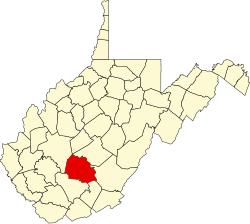Concho, West Virginia | |
|---|---|
| Coordinates: 37°58′1″N81°5′16″W / 37.96694°N 81.08778°W | |
| Country | United States |
| State | West Virginia |
| County | Fayette |
| Elevation | 1,686 ft (514 m) |
| Time zone | UTC-5 (Eastern (EST)) |
| • Summer (DST) | UTC-4 (EDT) |
| GNIS ID | 1554181 [1] |
Concho is an unincorporated community and coal town in Fayette County, West Virginia, United States. It used to be known as Thurmond Mountain. The name Concho is derived from the Concho River, in Texas. [2]


